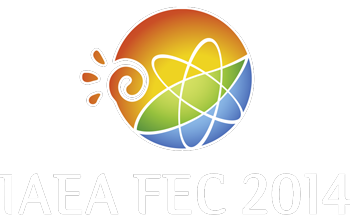Speaker
Dr
Linda E Sugiyama
(USA)
Description
Understanding the stability and behavior of 3D helical modes in the core of an axisymmetric toroidal configuration remains one of the challenges of fusion research [1-3]. A new type of periodic fishbone-like instability with a (1,1) internal kink-like structure [3] has been observed in Alcator C-Mod tokamak during the development of advanced non-inductive scenarios using radio frequency lower hybrid current-drive (LHCD). For the first time, measurements at high spatial and temporal resolution directly connect changes in the fast LH-generated electrons to the mode onset, saturation, and damping. Its radial profile has the characteristic Bessel function form of the cylindrical or lowest order toroidal 1/1 kink eigenfunction [3]. Suprathermal electron energies are measured directly using the downshift of electron gyrofrequency due to relativistic effects and correlate with the mode. The results suggest that the mode is destabilized by the nonresonant suprathermal electron pressure contribution to the central beta instead of the wave-particle resonance of traditional fishbones [3]. The independence of the fast electron pressure from the thermal pressure that drives the conventional internal kink also explains its varied co-existence with the sawtooth crash and precursor oscillations.
This work was performed under US DoE contracts including DE-FC02-99ER54512 and others at MIT and DE-AC02-09CH11466 at PPPL.
[1] L. Delgado-Aparicio, et al., Phys. Rev. Letters, 110, 065006, (2013).
[2] L. Delgado-Aparicio, et al., Nucl. Fusion, 53, 043019, (2013).
[3] L. Delgado-Aparicio, et al., Phys. Rev. Letters, submitted, (2014).
| Country or International Organisation | USA |
|---|---|
| Paper Number | EX/P6-20 |
Primary author
Dr
Luis F. Delgado-Aparicio
(Princeton Plasma Physics Laboratory)
Co-authors
Dr
Amanda Hubbard
(Massachusetts Institute of Technology, Plasma Science and Fusion Center)
Mr
Chi Gao
(MIT Plasma Science and Fusion Center)
Dr
David Gates
(Princeton Plasma Physics Laboratory)
Dr
Earl Marmar
(MIT Plasma Science and Fusion Center)
Dr
Gregory Wallace
(MIT Plasma Science and Fusion Center)
Mr
Ian Faust
(MIT Plasma Science and Fusion Center)
Dr
James Irby
(MIT)
Jerry Hughes
(MIT Plasma Science and Fusion Center)
Dr
John Rice
(MIT Plasma Science and Fusion Center)
Dr
Linda E Sugiyama
(USA)
Martin Greenwald
(MIT Plasma Science and Fusion Center)
Dr
Matthew Reinke
(ORISE)
Dr
Nicola Bertelli
(Princeton Plasma Physics Laboratory)
Dr
Nikolai Gorelenkov
(Princeton Plasma Physics Laboratory)
Dr
Perry Phillips
(University of Texas - Austin)
Dr
Randy Wilson
(Princeton Plasma Physics Laboratory)
Dr
Robert Granetz
(MIT Plasma Science and Fusion Center)
Mr
Robert Mumgaard
(MIT Plasma Science and Fusion Center)
Prof.
Ronald Parker
(MIT)
Mr
Seung Gyou Baek
(MIT Plasma Science and Fusion Center)
Dr
Stephen Wolfe
(MIT Plasma Science and Fusion Center)
Stephen Wukitch
(MIT Plasma Science and Fusion Center)
Dr
Steve Scott
(Princeton Plasma Physics Laboratory)
Dr
Syun'ichi SHIRAIWA
(MIT Plasma Science and Fusion Center)
Dr
William Rowan
(University of Texas - Austin)

